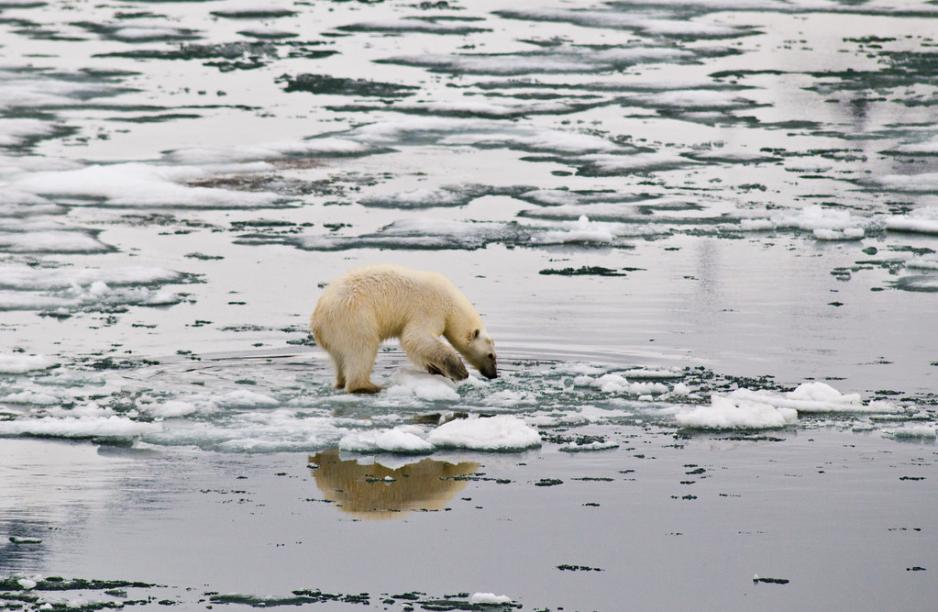With the Best of Intentions

More than any other animal, the polar bear, Ursus maritimus, is recognized as the symbol of the Arctic. With white fur and a sub-skin blubber providing insulation, the polar bear has adapted to live in severe cold conditions. The polar bear finds the majority of its prey on the sea ice – mostly seals. Photographer: Peter Prokosch/GRIDA
Dear reader!
A changing world has forced companies to be innovative in order to remain attractive. And even though “Trumpism” receives the most widespread attention, socialism is actually no longer a boo-word amongst young Americans.*
(*Between 18 and 29 years, according to a survey from Pew Research Centre)
The attitude amongst future large consumers has led capitalism to find new weapons in its fight against socialism. A new kind of capitalism is emerging; collective capitalism.
It is no longer enough to do good. One also has to be good.
Public accountability or tactics?
Last week, 180 powerful US business leaders gathered and changed their philosophy: From now on, the owners return on their money is no longer to be the sole and primary goal. The company is also to contribute to solving economic and social problems as well as climate changes.
But are the “ruthless leaders” of America’s Business Roundtable triggered by a sudden feeling of social responsibility and consciousness? Or is this simply a tactical move to position themselves before the American election campaign, where a.o. Elizabeth Warren has announced fight against big companies that do not behave well?
And does it really matter?
Yes, argues The Economist, who fears that this new form of “collective capitalism” may hurt more than it heals.
How are directors to know what “society” needs? And who gets to decide who gets what? There is a great chance that the decisionmakers will be non-representative politicians or leaders of big companies, and that the voices of “ordinary people” will drown in their campaigns.
Not just a joke
There is no lack of actions that are taken with (apparently) the best of intentions, yet turn out quite wrong.
Donald Trump’s wanting to buy Greenland to “relieve” Denmark of its annual block allocation is one example.
Yet it is worth noting, according to Andreas Raspotnik of The Arctic Institute, that Donald Trump – who is well known for denying that man-made climate changes exist – with one single tweet placed the region most affected by these changes at the center of global public attention.
And we are not quite letting go of Trump and Greenland quite yet. In this week’s long-read, you will find out why it is far too soon to reject Trump’s idea: It should rather be interpreted as the last in a series of signs indicating increased American interest in Greenland.
Loaded with gunpowder
The apparently “absurd” idea about buying Greenland poured water on the mill for Danish defense politicians, who brought up an old idea about having Denmark’s own fighter planes permanently based on Greenland.
The nearly abandoned American base on Keflavik, Iceland is slowly coming back to life again.
Russia has placed nuclear missiles in the Norwegian Sea, 16 kilometers from the Norwegian border.
The americans have stationed a Second Fleet Base further north, one that is scheduled to be operative again from the beginning of 2020, as it was during the Cold War.
“The list of military activity in the Arctic could be longer, yet it is already long enough to go through the peace ritual that plays out at every single Arctic conference”, our Editor-in-Chief Arne O. Holm writes in his Friday op-ed.
Yet every weapon used in the Arctic is justified from a desire to create peace.
Mistaken kindness?
In looking at the Arctic and what the region needs, we also see examples of mistaken kindness.
Using the climate as a shield, strategies aiming at protection of this vulnerable area are worked out without reflecting on the fact that the Arctic consists of eight different countries, each of which with its own unique starting point, society and needs.
The last in a long line out is Germany, which in its recently adopted strategy goes far in arguing for further restrictions against companies operating in the Arctic, protection of areas and changes to the Polar Code. We will get back to these issues next week.
The climate vulnerability of the Arctic made its way all the down to the G7 summit in Biarritz last weekend. French President Emmanuel Macron discouraged the use of new shipping routes in the Arctic: “This route will end up killing us. Because it may be faster, but it is a consequence of our former irresponsibility,” he argued, which lead CMA CGM – the world’s fourth largest container shipping company – to announce that it will no longer operate in the Arctic.
You can also read about how mining equipment may be sold at bargain prices because it is cheaper than managing it as hazardous waste.
Enjoy your weekend!
Siri Gulliksen Tømmerbakke
News Editor, High North News
